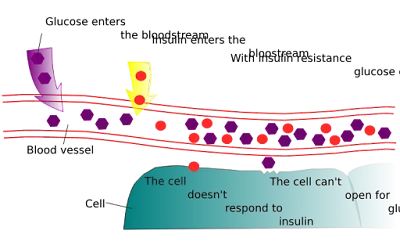In the landscape of modern health challenges, insulin resistance has emerged as a significant concern, affecting millions of individuals worldwide. This article aims to unravel the intricate threads of insulin resistance, shedding light on its origins, potential consequences, and actionable steps for managing this metabolic phenomenon.
 |
| Insulin Resistance: Causes, Impact, and Practical Solutions |
Whether you're seeking to understand its implications or searching for effective strategies to combat it, this comprehensive guide offers valuable insights to empower your health journey.
Understanding Insulin Resistance
A condition known as insulin resistance occurs when the body's cells stop responding to the effects of the hormone insulin, which is generated by the pancreas. Insulin plays a critical role in regulating blood sugar levels by facilitating the entry of glucose into cells for energy production. When cells resist insulin signals, glucose accumulates in the bloodstream, leading to elevated blood sugar levels.
 |
| simple illustration of insulin and glucose resistance in cells |
Causes of Insulin Resistance
- Sedentary Lifestyle: Leading a sedentary life can increase the risk of insulin resistance. Regular physical activity enhances insulin sensitivity and aids in glucose metabolism.
- Poor Dietary Choices: A diet rich in refined carbohydrates, sugars, and unhealthy fats can contribute to insulin resistance. These dietary habits lead to blood sugar spikes and strain the body's insulin response.
- Obesity: Excess body weight, particularly abdominal fat, is closely linked to insulin resistance. Insulin signaling is disturbed when inflammatory chemicals from fat cells are released.
- Genetics: Genetic predisposition can influence an individual's susceptibility to insulin resistance. Family history may have an impact on how it develops.
Effects of Insulin Resistance
Insulin resistance has far-reaching effects on health and well-being:
- Elevated Blood Sugar Levels: One of the primary consequences of insulin resistance is higher blood sugar levels, potentially leading to prediabetes and type 2 diabetes.
- Weight Management Challenges: Insulin resistance can make weight loss difficult, as it contributes to increased fat storage and hindered metabolism.
- Cardiovascular Risk: Insulin resistance is associated with heightened cardiovascular risks, including high blood pressure and an increased likelihood of heart disease.
- Hormonal Imbalances: Hormonal disruptions caused by insulin resistance can lead to conditions such as polycystic ovary syndrome (PCOS).
- Risk of Type 2 Diabetes: Prolonged insulin resistance can progress to type 2 diabetes, necessitating careful management.
Managing Insulin Resistance
- Balanced Diet: Adopt a balanced diet rich in whole foods, vegetables, lean proteins, and healthy fats. Minimize processed foods and sugars to stabilize blood sugar levels.
- Regular Exercise: Exercise frequently to increase insulin sensitivity. Incorporate a mix of aerobic exercises and strength training.
- Weight Management: Achieve and maintain a healthy weight to reduce strain on the body and alleviate insulin resistance.
- Mindful Eating: Pay attention to portion sizes and eat mindfully to prevent overconsumption and manage blood sugar levels.
- Sleep and Stress Management: Prioritize sleep and manage stress through relaxation techniques like meditation, yoga, and deep breathing.
- Medical Guidance: Consult healthcare professionals for personalized advice, especially if insulin resistance is suspected.
Navigating Insulin Resistance: Your Path to Wellness
As you embark on your journey to navigate insulin resistance and optimize your health, consider the following additional insights and tips:
- Hydration Matters: Staying adequately hydrated supports your body's overall functions, including metabolic processes. Opt for water as your primary beverage and limit sugary drinks that can contribute to blood sugar spikes.
- Nutrient-Rich Foods: Focus on nutrient-dense foods that provide essential vitamins, minerals, and antioxidants. These foods can support overall health and aid in managing insulin resistance.
- Frequent Meals: Consider eating smaller, balanced meals throughout the day to help prevent extreme blood sugar fluctuations. This approach can support steady energy levels and improved insulin response.
- Mind-Body Practices: Incorporate relaxation techniques such as meditation, deep breathing, and mindfulness into your routine. These practices can help reduce stress, which plays a role in insulin resistance.
- Regular Monitoring: Keep track of your blood sugar levels and consider using a journal to document your meals, exercise, and emotions. This record can help you identify patterns and make informed adjustments to your lifestyle.
- Celebrate Progress: Recognize and celebrate the small victories along your journey. Whether it's reaching a fitness milestone, choosing a balanced meal, or managing stress effectively, each step counts toward your well-being.
- Community Support: Engage with support groups, online communities, and social networks that focus on metabolic health and insulin resistance. Sharing knowledge and getting inspiration from others may be quite beneficial.
- Consistency Matters: Remember that managing insulin resistance is a long-term commitment. Consistency in your lifestyle choices, such as diet, exercise, and stress management, can yield lasting benefits over time.
- Educate Yourself: Stay informed about the latest research and information related to insulin resistance. As science advances, new strategies and insights may emerge to help you better manage the condition.
Conclusion
Insulin resistance is a multifaceted challenge that requires dedication, knowledge, and a proactive approach. By understanding its causes, effects, and practical strategies for management, you can take charge of your health and work toward optimal well-being.
Empower yourself with the tools and resources available to you, and never underestimate the impact of your choices. Every step you take, whether it's a mindful meal choice, a brisk walk, or a stress-reducing practice, contributes to your journey toward improved metabolic health.
As you embark on this path, remember that you're not alone. Seek guidance from healthcare professionals, engage with supportive communities, and stay curious about the ways you can enhance your health and vitality.
By taking small, consistent steps and staying informed, you have the power to navigate insulin resistance and embrace a life filled with energy, vitality, and wellness. Your journey is unique, and with determination and informed decisions, you can pave the way for a brighter, healthier future.

Comments
Post a Comment